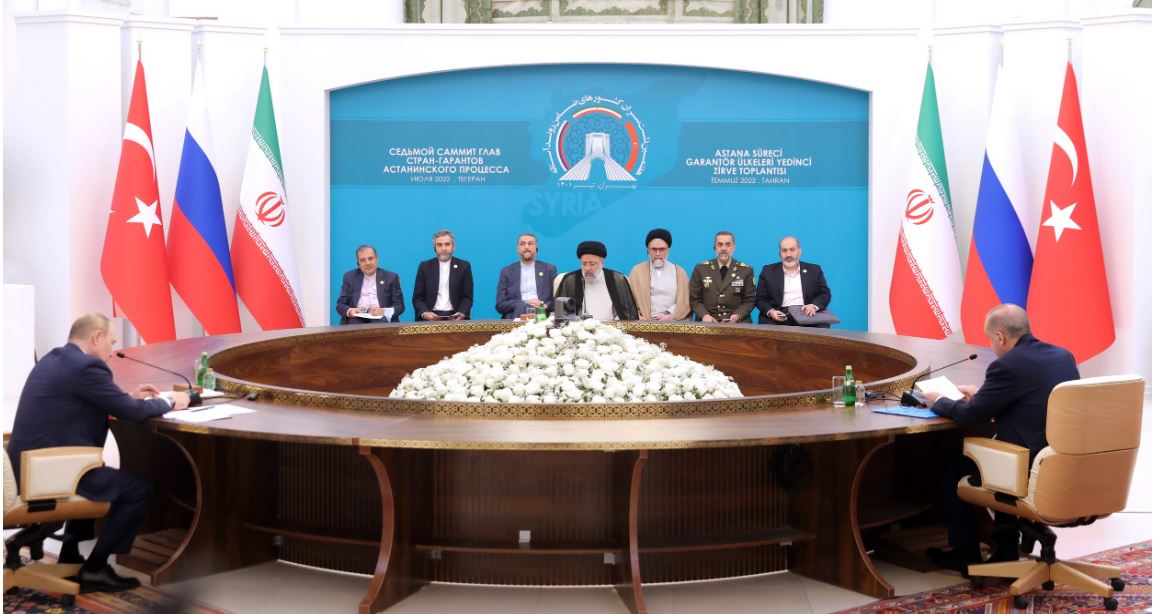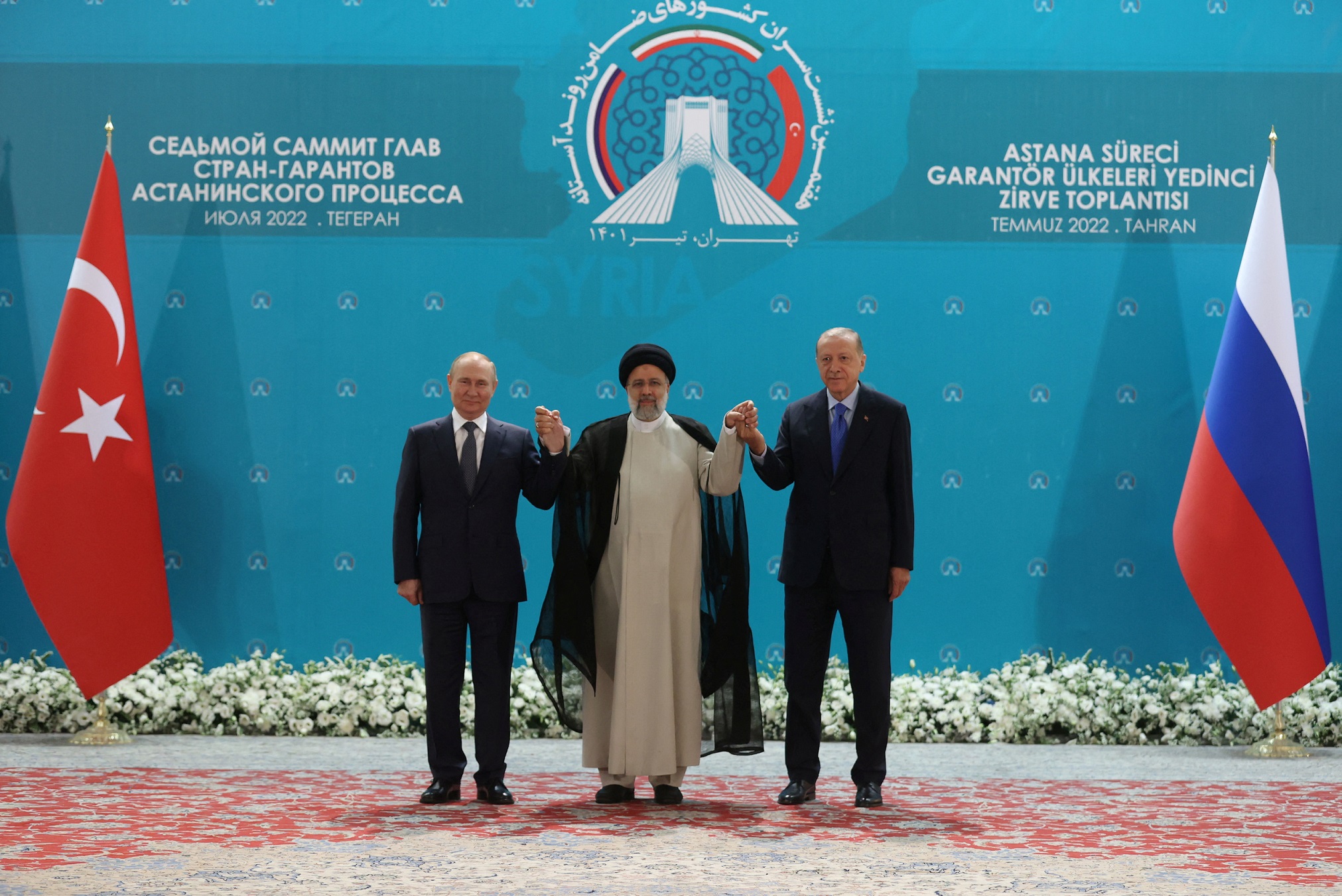Publications
INSS Insight No. 1623, July 26, 2022
The visit by Russian President Vladimir Putin and Turkish President Recep Tayyip Erdogan in Tehran – the first such visit since the outbreak of the war in Ukraine in February 2022 – offered the three leaders an opportunity to demonstrate their partnership against the West and discuss the challenges they face domestically, regionally, and internationally. Iran viewed the summit as a chance to tighten its strategic relations with the Kremlin, in part in response to the idea of a regional defense alliance led by Washington. Russia viewed it as an opportunity to show the world – and its own domestic audience – that it is not isolated and there is international willingness to accept a multipolar world order that is not led by the United States alone. Regarding Syria, the summit reflected a Russian-Iranian interest in dissuading Turkey from launching a new military operation in northern Syria, which Ankara sees as a vital strategic interest. Yet notwithstanding the summit, which reflects a partial confluence of interests among the three states, the relations among them continue to be marked to a great extent by competition, opposing interests, and mutual suspicion. It is thus unlikely that the three states will be able to implement the bilateral agreements reached during the summit, and particularly unlikely that they will collaborate in formulating a cohesive anti-Western axis.
The visit by Russian President Vladimir Putin and Turkish President Recep Tayyip Erdogan in Tehran – the first such visit since the outbreak of the war in Ukraine in February 2022 – offered the leaders of the three countries, who are subject to varying levels of international sanctions, an opportunity to demonstrate their partnership against the West and discuss the challenges they face domestically and internationally. During the visit the three Presidents participated in a summit within the framework of the Astana Process on Syria. The Russian and Turkish Presidents also held bilateral meetings with Iranian Supreme Leader Ali Khamenei, and with President Ebrahim Raisi. Each country viewed the summit as an opportunity to advance its own interest, both bilaterally and vis-à-vis Syria.
Bilaterally, Tehran saw President Putin’s visit as an opportunity to expand cooperation with Russia within its “look to the east” policy, which has been pursued by the Iranian leadership over the past few years in response to its increasing isolation. Over the last few months, the two countries have held a series of consultations on potential cooperation in coping with Western sanctions, on the basis of Iran’s experience circumventing economic sanctions. During the visit the Iranian press reported that the Iranian national energy company signed a “historic agreement worth $40 billion” with the Russian government gas corporation Gazprom for mutual investments in oil and gas projects. However, it is highly doubtful that Russia is capable at present of investing such large sums in developing oil and gas fields in Iran. Furthermore, the two countries are still more competitors than partners in the energy field. Since the outbreak of the war in Ukraine, Iranian crude oil sales to China have suffered a severe hit due to the sale of reduced-price Russian oil to China. Trade levels between Russia and Iran are not very high; in 2021 there was an increase to the level of $4 billion worth in mutual trade, but this is still considered relatively little, and trade is primarily in food products, especially exports of Russian wheat to Iran. Iran and Russia also cannot carry out their transactions using Western currency due to sanctions, and attempts to carry out transactions via barter have remained very limited, given that most of what is produced by one country does not interest the other.
The crisis in Ukraine has also given Iran an opportunity to deepen its military cooperation with Moscow; military discussions were likely held during the visit, and one of the members of the Russian delegation that accompanied Putin was the Head of the main intelligence branch of the Russian Armed Forces (formerly GRU). During the visit a draft agreement on strategic cooperation between the two countries was exchanged, which includes a section on military-technical cooperation. This agreement is designed to replace the previous agreement between the two states, which was first signed in 2001 and extended several times until it expired in 2020. Until the Russian invasion of Ukraine, Russia limited its military cooperation with Iran for fear of Western response. This constraint no longer exists, and Russia might offer Iran advanced military technologies that until now were beyond its reach.
Iran has a clear interest in tightening its strategic relations with the Kremlin, in part in response to the idea of a regional defense alliance led by Washington. This idea is a source of significant concern in Tehran, particularly in light of the deadlock in the nuclear talks and the possibility of further escalation between Iran and the West. Russia for its part sees such a defense alliance, led by Washington, as a threat to its regional interests. In this context Ankara is still sitting on the fence; on the one hand the normalization process with the United Arab Emirates, Saudi Arabia, and Israel brings it closer to the Washington-led axis, while on the other hand, its deep disputes with them and Western actors brings it closer to Russia and Iran.
President Putin’s visit took place shortly after reports were published in the US of Iran’s intent to supply Russia with hundreds of unmanned aerial vehicles (UAVs) for use in Ukraine. The White House even published information, supported by satellite images, that Russian officials have visited a military base in central Iran at least twice, in order to examine the possibility of operating UAVs with offensive capabilities in Ukraine. Iran did not confirm the report and the Iranian foreign minister actually denied it to his Ukrainian counterpart, but the commander of the Iranian Ground Forces, Kioumars Heydari, said just before President Putin’s visit that the Iranian army manufactures highly advanced UAVs and is willing to export military equipment and weapons to friendly nations. In any event, it is unlikely that Iran has the capacity to produce hundreds of advanced UAVs in a short time, and thus even if Russia purchases UAVs from Iran, it will not be a large-scale purchase. If Iranian UAVs are in fact supplied to Russia, a combat arena could develop in Ukraine that involves Turkish-manufactured UAVs possessed by Ukraine against Iranian-manufactured UAVs used by Russia.
In the Syrian context, the tripartite meeting in Tehran reflects an Iranian-Russian interest in dissuading Turkey from realizing its intention to launch a new operation in northern Syria. Ankara views Kurdish control, and especially the dominance of the Syrian branch of the Kurdish underground in northern Syria, as a security threat. There is also longstanding frustration in Ankara over the late 2015 Kurdish crossing of Turkey’s red line drawn to dissuade the Kurds from using the struggle against the Islamic State to seize territory west of the Euphrates. Beyond the security threat, the presence of Syrian refugees in Turkey is also a burning domestic issue, which has led to decreased support for Erdogan and his party, especially in light of the ongoing decline of the Turkish economy.
Iran fears that an additional Turkish military operation will further undermine President Assad’s control in Syria and expand Turkish military presence in the region around Tal-Rifaat in the northern suburbs of the Aleppo province, adjacent to the two Shiite cities of Nubl and Zahra, which is an area under the influence of Iran and pro-Iranian militias. During his meeting with President Erdogan, Khamenei warned that a military operation in northern Syria would necessarily harm Turkey, Syria, and the region at large, while benefiting the terrorists. From the statements issued it appears that Iran and Russia did not manage to persuade Erdogan to refrain from launching a new military operation in northern Syria, although they may have managed for now to prevent the Turks from expanding their operations in northeast Syria and to limit the aims of the impending operation to Tal-Rifaat and Manbij, which are west of the Euphrates.

The Iranians and Russians likewise diverge regarding Israeli activity in Syria. In the official summary of the tripartite summit, which was issued by the Kremlin, there was no mention of Israeli attacks in Syria, even though Iran raised this subject and demanded a cessation of Israeli activities. In spite of the differences between the three states, it appears that they recognize the need to reach some sort of agreement in order to maintain their respective interests in Syria.
From the Russian perspective, the meeting in Tehran offered an opportunity for President Putin to show the world and his domestic audience that Russia is not isolated internationally and maintains good relations with other countries, including Turkey, a NATO member. This is notwithstanding the sanctions and significantly cooled relations between Moscow and many countries, particularly in the West. Furthermore, the meeting ostensibly reinforces Russia’s view that many states prefer a multipolar rather than a US-led unipolar world.
From Turkey’s perspective, the summit was held against the backdrop of increasing tensions between Ankara and Tehran on a number of issues, including competition for influence in the Caucasus and in Iraq, disputes over water resources, and rage in Ankara about infringement on Turkish sovereignty via espionage and attempted assassinations of Iranian exiles on its territory, as well as attempted Iranian attacks on Israeli targets in Turkey. Within the framework of the seventh meeting of the Turkey-Iran High-Level Cooperation Council, Ankara and Tehran signed agreements for mutual investments and diplomatic, communications, and commercial cooperation, and committed to tripling trade between them, and even more, to $30 billion. However, commitments to expand trade between the countries significantly have been made in the past and have not yet been fulfilled. Erdogan’s focus on expanding cooperation in defense industries is also an indicator of the difficulty of further developing civilian trade between the states. The expansion of cooperation on gas is likewise in doubt, given that over the past few years Turkey has diversified its energy sources, and also given the indignation in Ankara about the temporary cessation of Iranian gas exports in January 2022.
In conclusion, the summit in Tehran reflected a partial confluence of interests for Iran, Russia, and Turkey, alongside continued disagreements, opposing interests, and mutual suspicions. It is doubtful whether the leaders of the three countries are able to fulfill the agreements that were reached during the summit, and even more doubtful that they can advance their cooperation to the level of consolidating a substantive anti-Western axis that can successfully cope with the challenges they face domestically, regionally, and internationally. This is especially true for Turkey; the dividends it hopes to reap from normalization processes with other countries in the region, and the way Western countries will respond to its security demands, will significantly influence its degree of cooperation with Russia and Iran.



